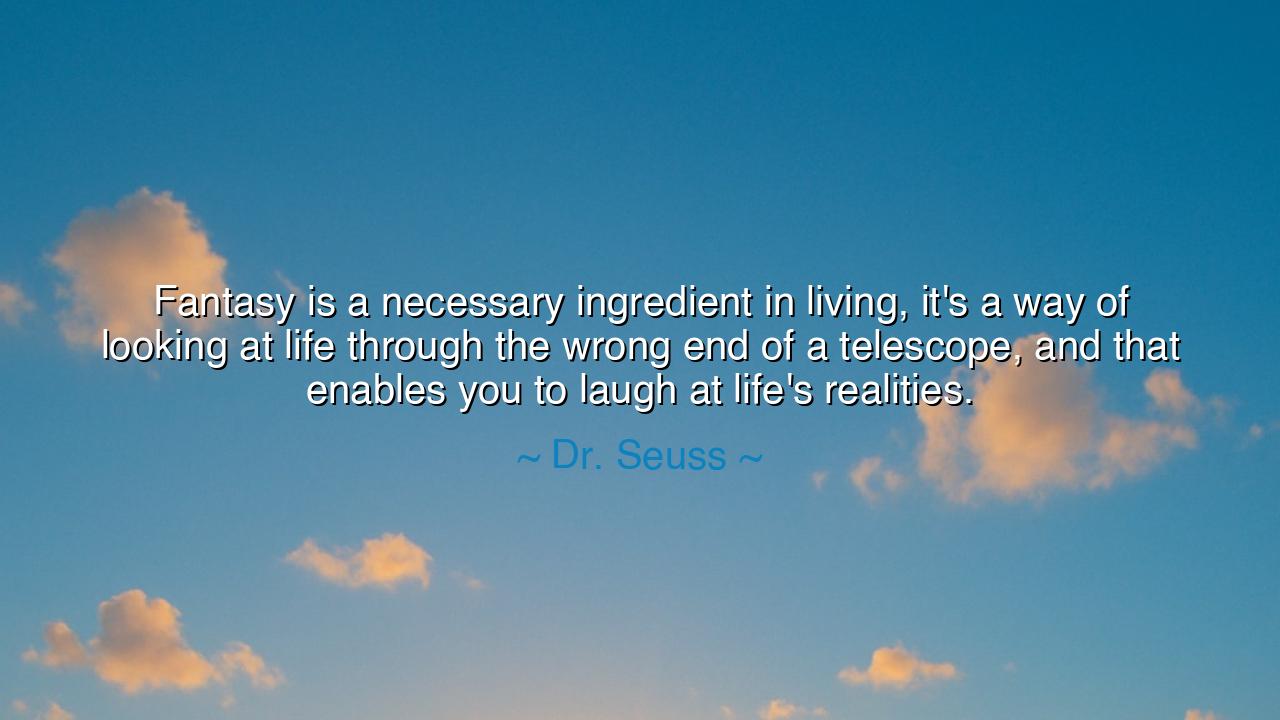
Fantasy is a necessary ingredient in living, it's a way of
Fantasy is a necessary ingredient in living, it's a way of looking at life through the wrong end of a telescope, and that enables you to laugh at life's realities.






“Fantasy is a necessary ingredient in living, it's a way of looking at life through the wrong end of a telescope, and that enables you to laugh at life's realities.” Thus declared Dr. Seuss, master of whimsy, whose verses carried truths hidden in the play of rhyme and wonder. In these words, he reminds us that fantasy is not mere escapism but a sacred tool, a lens that reshapes the heaviness of the world into something bearable, something even joyful. To look through “the wrong end of a telescope” is to see life from a new angle, smaller perhaps, but lighter, stripped of its crushing weight.
The ancients knew this wisdom, though they named it differently. Plato spoke of myth as a vessel for truth, stories that clothed the eternal in playful disguise. The bards sang of gods and monsters, not only to entertain, but to teach men how to face their fears with courage. In the East, sages wove parables and fables, cloaking wisdom in simplicity so that children and kings alike could laugh and learn. Fantasy has always been the companion of truth, softening its blow with wonder.
Consider the life of Winston Churchill during the Second World War. In the darkest hours, when bombs fell upon London, he did not only call his people to endurance—he also called them to humor. He made jokes, sometimes bitter, sometimes absurd, and in so doing, gave his people permission to laugh even at terror. This was the power of Seuss’s vision: to use laughter born of perspective, to lighten burdens too great for the human heart to carry alone.
Dr. Seuss himself wrote in times of great trial. His books, though bright and filled with absurd creatures, were born in the shadow of wars and hardships. He knew that children—and indeed adults—needed fantasy to process the world around them. A Sneetch, a Lorax, or a Cat in the Hat was not mere entertainment, but a way of confronting greed, prejudice, or destruction without despair. By looking at life “through the wrong end of a telescope,” one could see truth made smaller, less overwhelming, and therefore laugh instead of weep.
O children of the future, mark this well: without fantasy, the soul grows heavy, choked by the weight of sorrow. Without laughter, the heart hardens into stone. But with the power of imagination, reality is not denied, but transformed. You do not escape the storm, but you learn to dance in its rain. You do not silence your troubles, but you teach yourself to smile at them, and thus they lose their power.
The lesson is clear: embrace fantasy not as folly, but as wisdom. Do not scorn the dreamer or the storyteller, for they carry medicine for the spirit. When life grows too heavy, let your imagination reframe it. Write, draw, sing, or laugh, and you will find the sharpness of reality softened. And when you share these dreams with others, you do more than heal yourself—you lift the weight of the world from another’s shoulders as well.
Therefore, let your practice be this: cultivate imagination. Read stories, tell jokes, play with absurd ideas. When hardship comes, step back, turn the telescope around, and see the world from a stranger, lighter angle. In that shift, you will find both humor and strength.
So I say unto you: remember Dr. Seuss’s wisdom. Fantasy is not escape from life—it is the art of living it well. Through imagination, we endure; through laughter, we triumph. And in the end, we find that even life’s harshest realities can be met with courage, if first we learn to smile at them.






AAdministratorAdministrator
Welcome, honored guests. Please leave a comment, we will respond soon